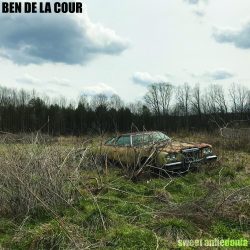An album of gothic Americana that explores the dark and murky side of the American dream.
 Ben de la Cour is an interesting character. Born in London but raised in Brooklyn, he played clubs like CBGBs as a young teen. He then left home for Cuba where he boxed and busked, went to New Orleans to be the “world’s worst bartender/bouncer” and ended up in East Nashville, where he went to work on his long history of addiction and mental illness. He got clean a few years ago and now releases his fifth album ‘Sweet Anhedonia’ an interesting title as the definition of anhedonia is “the inability to experience pleasure” – the opposite of hedonism.
Ben de la Cour is an interesting character. Born in London but raised in Brooklyn, he played clubs like CBGBs as a young teen. He then left home for Cuba where he boxed and busked, went to New Orleans to be the “world’s worst bartender/bouncer” and ended up in East Nashville, where he went to work on his long history of addiction and mental illness. He got clean a few years ago and now releases his fifth album ‘Sweet Anhedonia’ an interesting title as the definition of anhedonia is “the inability to experience pleasure” – the opposite of hedonism.
The album opens with ‘Appalachian Book of The Dead’ which possibly shows where de la Cour’s mind is currently at. It starts oddly with a weird almost Tom Waits like sound and continues with horns and eerie strings as de la Cour sings about ‘Something cold is stirring at the bottom of the creek, where that little boy drowned back in ’63 and the ink is running over In the Appalachian Book of the Dead’ – this isn’t for the fainthearted. This is followed by ‘Numbers Game’ another track with an eerie feel about it that turns into a duet with Becky Warren who intones ‘You don’t meet a lot of folks on a double shift or lined up waiting at the clinic on your methadone’ to a fairly jaunty tune. The third track is ‘Maricopa County’ a dark tale of an American town where ‘Two girls from my high school disappeared in May. They took a shortcut home one night, fell off the earth along the way and I can still see those two empty chairs on graduation day’ whilst a plaintive trumpet plays in the background.
Track four ‘Shine On The Highway’ is a big cinematic soundtrack with female background vocals, strings and mariachi-style horns. This is followed by the title track which starts with another weird intro before developing into another song with dark, foreboding lyrics ‘Sweet Anhedonia I should have known you’d be back with your sickle and shawlyour dreams dressed in black. How does it feel to feel nothing at all?’. The sixth track is the only out and out rocker on the album ‘Suicide Of Town’ which doesn’t work as well as the other ten tracks on the album which are either ballads or mid-tempo. The next track ‘Palookaville’ is one of those ballads starting out with a gentle piano before it’s joined by a lone melancholic trumpet as the narrator tells the complicated story of living in Palookaville an imaginary place mentioned in ‘On The Waterfront’ that’s a symbol for ‘the home of the mediocre and incompetent’.
Next comes ‘Brother’ a gentle ballad and that’s followed by ‘Birdcage’ another dark, gothic tale of America that has echoes of Tom Waits in the way it starts with banjo, harmonica and stomps – it’s a blues holler that tells the tale of a mining disaster ‘He went down the mine shaft three days later but he never came up again’. This is followed by ‘American Mind’ another story ballad of small town America ‘The road to heaven is paved with sorrow, some folks are just dying just to get in, some’ll have to face tomorrow, I wouldn’t feel so bad if I didn’t have to make it rhyme but that’s a small price to pay for the grace of God – we love our American Mind’. The album ends with the enigmatic ‘I’ve Got Everything I Ever Wanted’: ‘I took life by the hand and I gave it some kind of a whirl Just another left foot walking through a right shoe world. I left in the sunshine came home in the pouring rain feeling just about as empty, as empty as a midnight train’.
The album is superbly produced by Jim White and recorded at various studios in Athens GA and Nashville TN. De la Cour is backed by a number of musicians playing a variety of instruments – too many to name here – but the arrangements are exceptional adding an off-beat sound to de la Cour’s left-field lyrics. The combination of instruments mean that no two tracks sound the same and it keeps the listener slightly disorientated waiting to hear what comes next.
Ben de la Cour has a superb voice and its sweetness often contrasts with the lyrics of his songs. His writing has a lot in common with Harry Chapin’s off-beat look at all things American and at times he sounds a little like Chapin, Leonard Cohen and the aforementioned Tom Waits – not too shabby a group of americana troubadours to be compared with.


